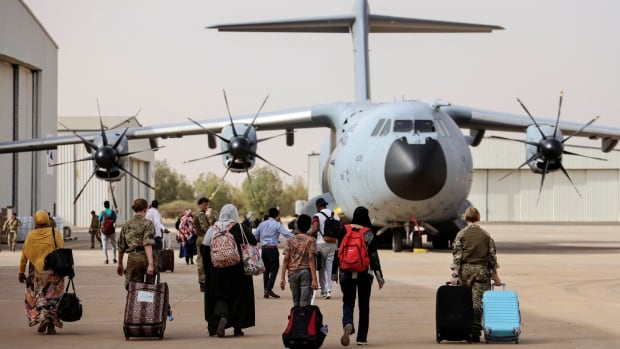Global Courant 2023-04-29 13:00:52
The evacuation of Canadians from the Sudan raises some thorny questions about the federal government’s obligations to citizens in danger abroad – and its ability to help them.
By Friday, Ottawa had evacuated 250 Canadians from Sudan, which is currently embroiled in a bloody new civil conflict. Ottawa says some of the evacuees left on flights organized by Canada’s allies, while 117 got off on Royal Canadian Air Force (RCAF) transport planes. The Canadian Forces (CAF) deployed troops to support the effort.
The government has received hundreds of requests for assistance from Canadians and their families in Sudan.
But while the government is now evacuating Canadians from Sudan, it has argued in the past that it really doesn’t need to.
“Traditionally, the Canadian government has taken the position that it has no legal obligation to repatriate Canadians abroad,” Yves Le Bouthillier, a law professor at the University of Ottawa, said in an email.
Section 6(1) of the Charter of Rights and Freedoms states that every Canadian citizen “has the right to enter, remain and leave Canada”.
That right does not necessarily mean that the government has to rescue Canadians in need around the world.
“At the very least, the Canadian government has a legal obligation not to create obstacles to the return of Canadians from abroad,” said Le Bouthillier.
Whether the government is required to repatriate Canadians is a question now before the courts.
Earlier this year, the Federal Court ruled that Canada must repatriate four Canadian men from Syria. The government is hesitant to do so because the men are suspected of joining the terrorist group ISIS.
The government appealed the decision, saying in its appeal that the Federal Court judge erred in “effectively” creating a “right of return”.
Le Bouthillier said the Federal Court of Appeals is likely to rule on the case within months.
Evacuations test Canada’s diplomatic military capabilities
While the Canadian government does not believe it has a legal obligation to evacuate citizens abroad, it usually makes an effort when Canadians are trapped by war, severe civil unrest or natural disasters.
But even if the government wants to help, practical difficulties can stand in the way.
Evacuation operations often require cautious diplomatic and military involvement, according to foreign affairs experts. Canada’s ability to evacuate civilians depends on many factors, including geography, Canada’s relationship with the country where civilians are at risk, and the availability of Canadian or allied military assets.
Colin Robertson, a Canadian Global Affairs Institute Fellow and former Canadian diplomat, said Canadian embassies abroad ask Canadian citizens living in potentially dangerous places to register with them to facilitate assistance when disaster strikes.
“Only about five or 10 percent of people actually take up these offers, and the lists are usually hopelessly out of date when disaster strikes,” Robertson said.
Robertson said that in a crisis situation, diplomats will focus on securing air clearance for evacuation flights, cooperating with allies and communicating with local authorities.
These efforts require a robust diplomatic presence on the ground — and Robertson said Canada can’t always guarantee that.
“We have not invested in our diplomatic capacity for about 20 years. In fact, we have reduced it,” he said.
Robertson said that while Canada has increased the number of diplomatic staff over the years, staffing levels have not kept pace with the demand for consular assistance. That’s largely because Canada’s population is more diverse and Canadians are traveling and living abroad more than they used to, he said.
“Is it raised enough? Well, you would have to judge by recent incidents and you would probably conclude no, we need to put more emphasis, and that means more people – to use the military term, more boots on the ground – for desperate situations Robertson said.
Denis Thompson, a retired Canadian army major general, said the military faces other problems when it evacuates civilians trapped abroad.
Members of the Canadian Forces work on a CP140 Aurora surveillance aircraft at the Canadian Forces base in the Persian Gulf on Feb. 19, 2017. Denis Thompson, a retired major general in the Canadian army, said the CAF keeps the armed forces highly prepared to respond to situations like the one unfolding in Sudan. (Ryan Remiorz/The Canadian Press)
“Sudan is more than 7,000 miles from our main air base, which is (in) Trenton, Ontario. So we should remember that Canada does not have permanent bases abroad like some of our allies.” said Thompson.
“If this happened in Haiti, yes, we could be there overnight. But it didn’t happen in Haiti — it happened in Sudan, and that’s a long way from home.”
Thompson said that while a network of global military bases would alleviate logistical challenges, the cost to Canadian taxpayers would be enormous. He said Canada would be wise to rely on close allies such as the US and UK, who have bases around the world.
The government has said it has ordered up to 200 CAF troops to assist evacuation efforts in Sudan, but a defense official told a technical briefing on Thursday that the number does not include aircrew, special forces or naval personnel involved in the operation. used to be.
While Chief of the Defense Staff General Wayne Eyre has recently expressed concern about the Army’s overall operational readiness, Thompson said the CAF is well prepared for this type of operation.
“The Army maintains a non-combatant evacuation company on standby at all times, as does the DART, the Disaster Assistance Relief Team,” Thompson said. “The RCAF does the same thing on aircraft.”
But Robertson said he is concerned about Canada’s ability to respond to crises around the world, especially as the country’s population becomes more diverse and the world more dangerous.
“We probably need more people on the ground,” he said.
“We must have the capacity to handle both our growth as a country and the changing geopolitical situation.”








